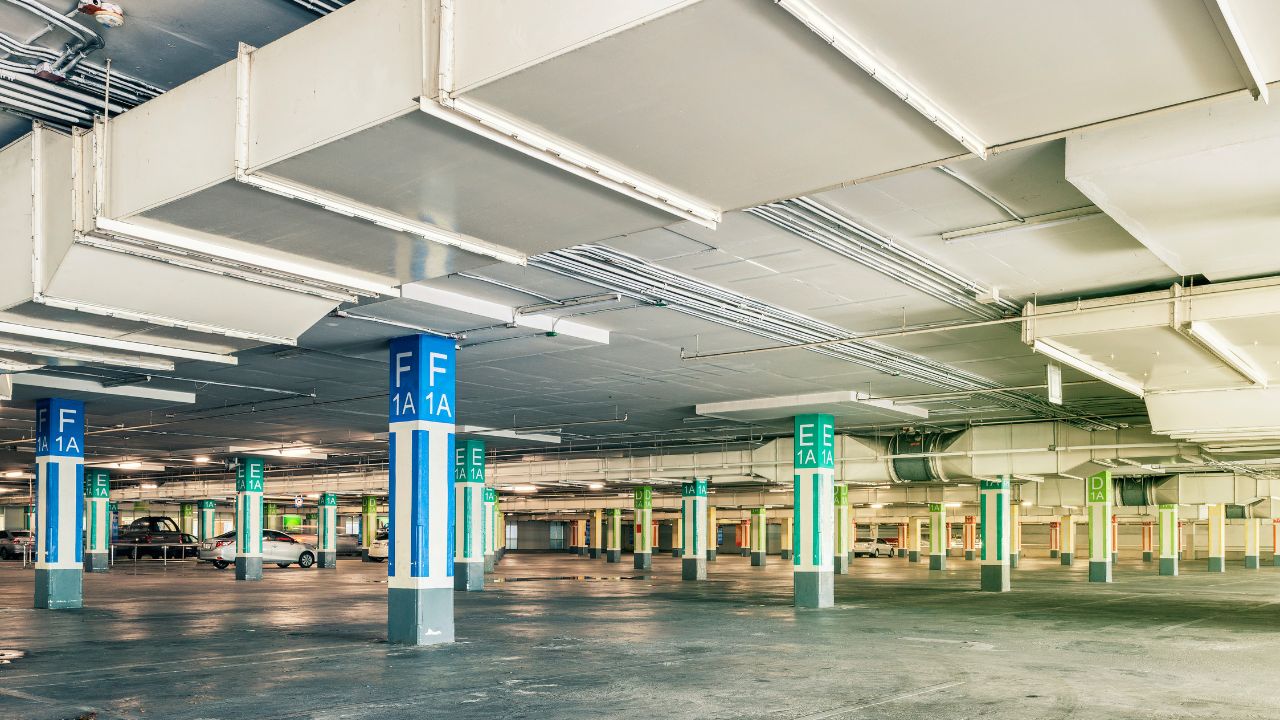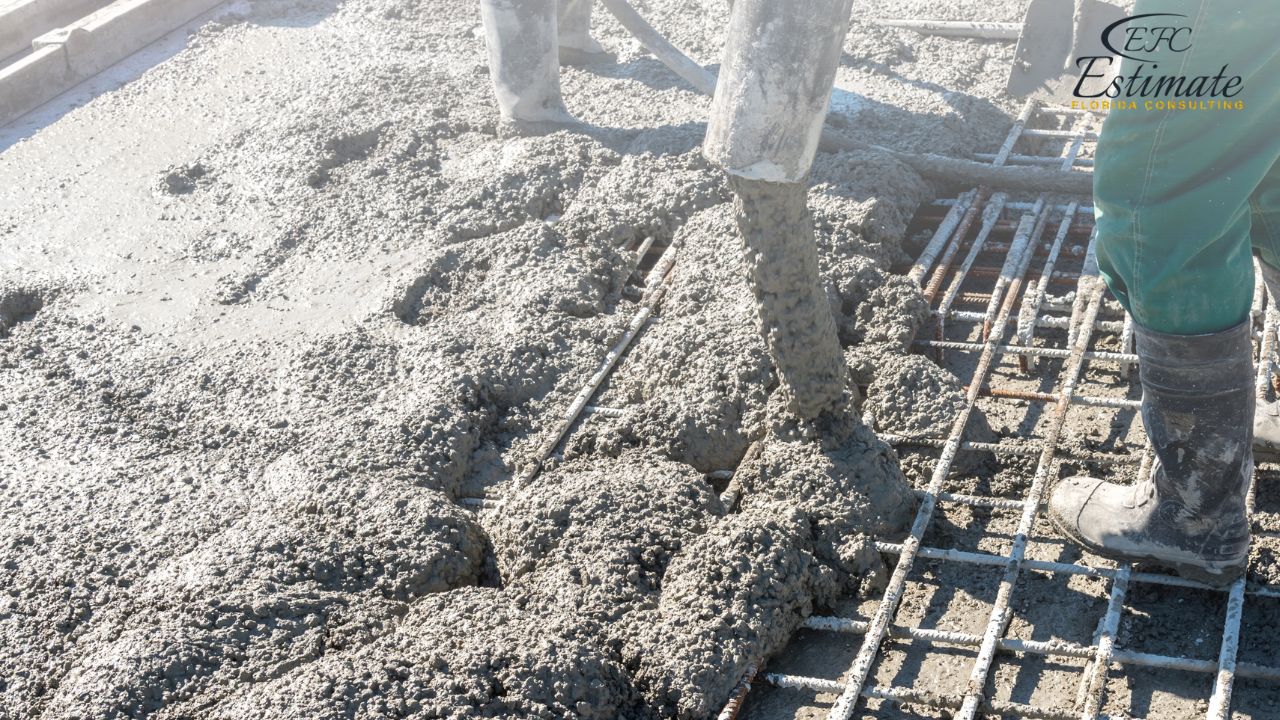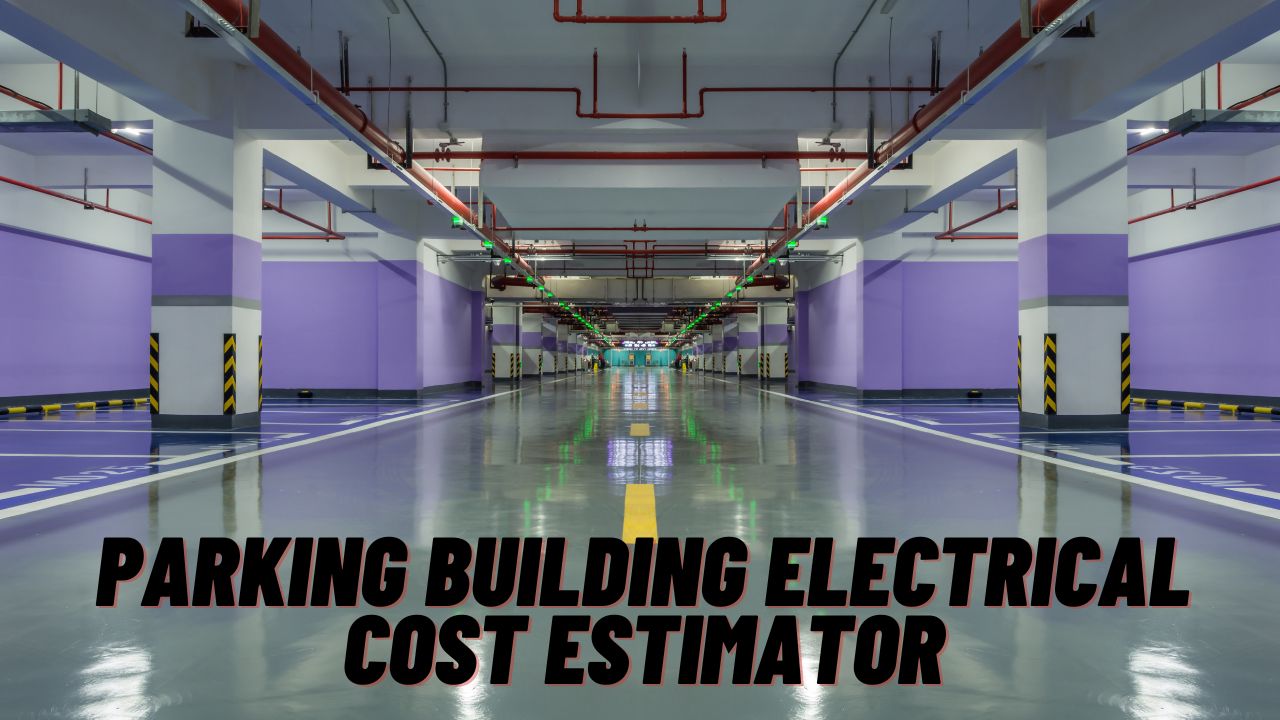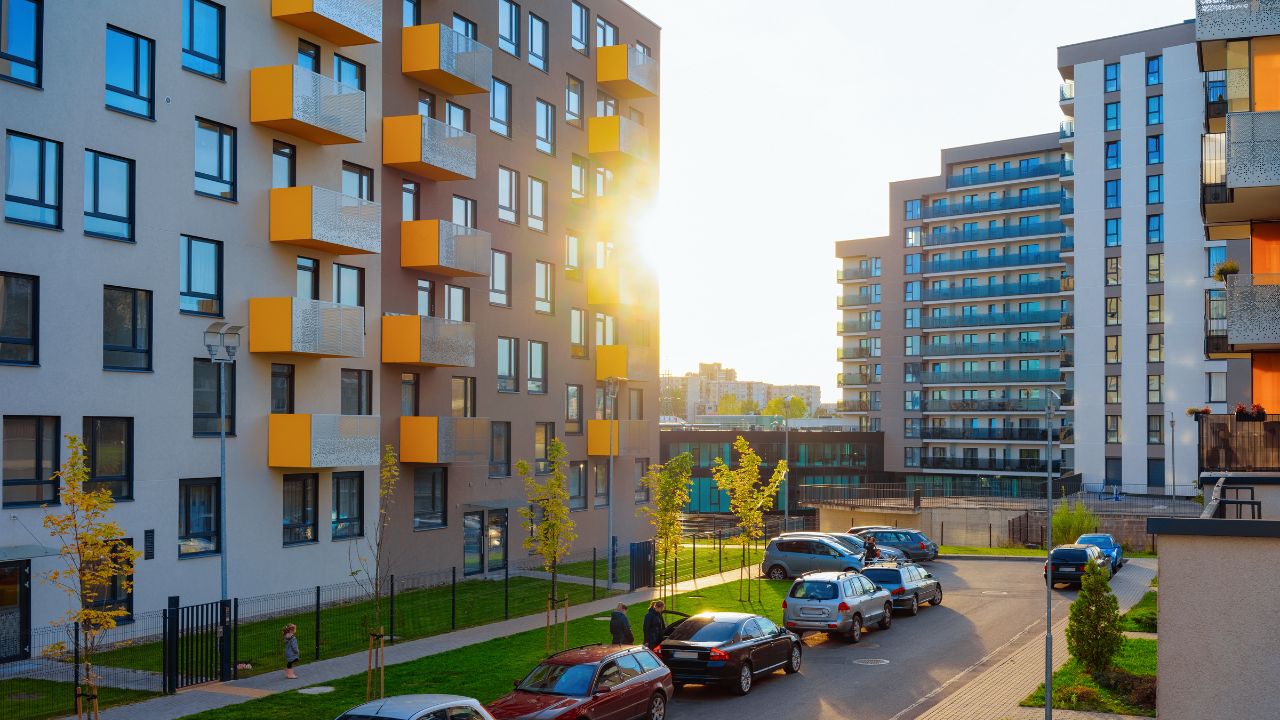How Much Does it Cost to Build a 4-Story Parking Garage?
Providing sufficient parking spaces is a critical concern for businesses, municipalities, and urban centers. As visitor numbers increase, the demand for accessible parking grows, necessitating the construction of efficient parking facilities. Multi-level parking garages offer an effective solution, maximizing the use of limited space by accommodating more vehicles per square foot compared to surface lots.
The cost of building a parking garage varies depending on factors such as size, design, and location.
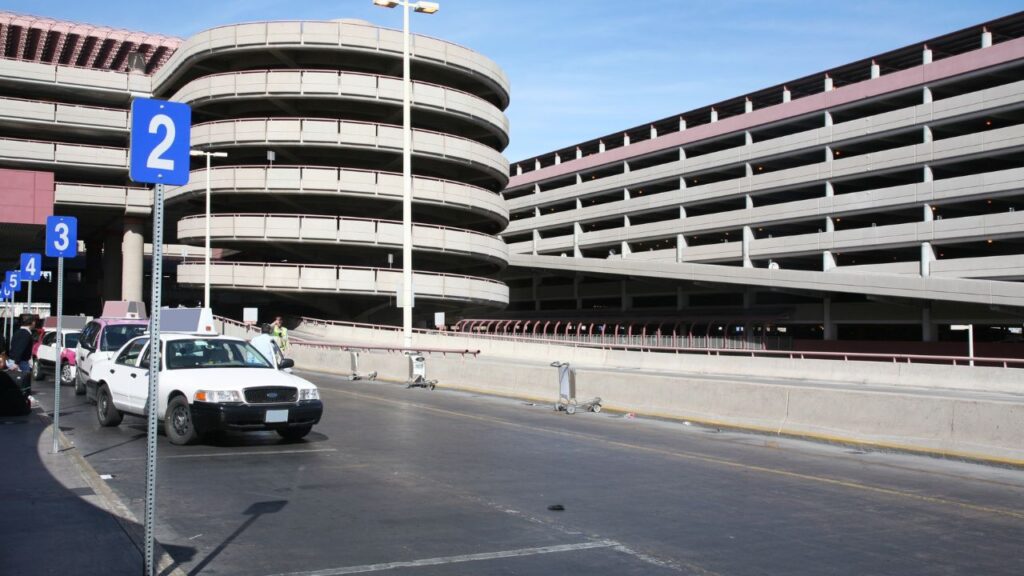
On a national scale, the average price falls between $8.25M and $13.2M, with the typical expenditure for a 150,000 sq.ft. multi-level parking garage above ground amounting to approximately $10.725M. At the lower end of the spectrum, constructing a 30,000 sq.ft. surface lot entails costs starting from $165,000. Conversely, the upper limit reaches $22M for a 250,000 sq.ft. multi-level parking garage spanning two underground levels and equipped with two four-person elevators.
Costs to Build a Parking Garage
National Average Cost | Average Range | Low-end | High-end |
$10.725M | $8.25M-$13.2M | $165,000 | $22M |
Traditional vs Precast Garage Cost
When it comes to building parking garages, precast materials are the go-to choice for most projects nowadays. These materials, typically concrete pillars and forms, offer a cost-effective and efficient solution. Although they require transportation and heavy equipment for installation, precast materials streamline the construction process, saving time compared to pouring and curing concrete on-site.
With precast materials dominating the market, it’s essential to consider the cost per space. For precast garages, the average cost per space falls between $21,450 and $28,600, while traditional garages come in at a higher range of $34,650 to $46,200 per space. Typically, a parking space ranges from 300 to 400 square feet, with 340 square feet being the most common size.
Type | Average Price per Space (Labor Included) |
Precast | $21,450 – $28,600 |
Traditional | $34,650 – $46,200 |
Parking Lot Costs per Square Foot
The cost of building a parking lot per square foot can vary significantly depending on the type of construction. For a precast parking lot, you’re looking at approximately $55 to $88 per square foot, with $71 per square foot being the most common rate. However, these costs can fluctuate based on location, with urban areas usually seeing higher overall expenses.
Size | Precast Cost (Labor Included) |
50,000 sq.ft. | $2.75M – $4.4M |
100,000 sq.ft. | $5.5M – $8.8M |
150,000 sq.ft. | $8.25M – $13.2M |
200,000 sq.ft. | $11M – $17.6M |
250,000 sq.ft. | $13.75M – $22M |
Parking Garage Cost by Number of Levels
The cost of building a parking garage varies based on factors like the number of levels and the type of garage. For instance, you might pay between $15,400 and $33,000 per parking space. Multi-level garages are the most common type because they maximize space utilization. While small, single-level garages restrict the number of vehicles they can accommodate, they often entail lower construction costs as they don’t require as robust a foundation to support additional levels.
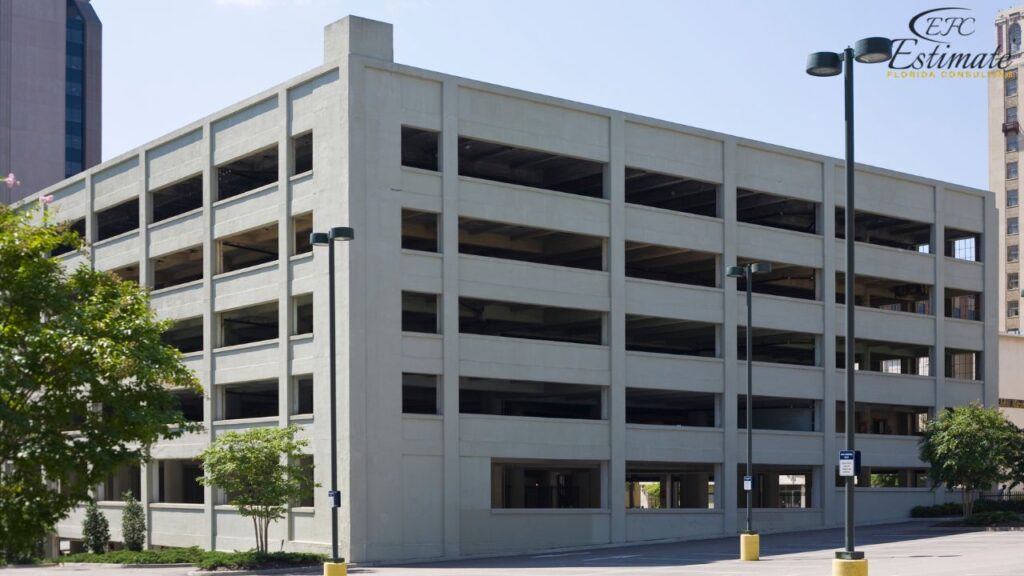
Number of Levels | Cost per Space (Labor Included) |
Single-Level | $15,400 – $22,000 |
Multi-Level | $20,900 – $33,000 |
Single-Level Parking Garage:
Building a single-level parking garage comes with an average cost ranging from $15,400 to $22,000 per space. While they are less common compared to surface lots or multi-level garages, they offer a convenient solution without the need for complex foundation designs to support additional levels. However, their construction cost is higher than surface lots, and they don’t maximize space efficiency like multi-level garages do.
Multi-Level Parking:
Multi-level parking garages, on the other hand, are the priciest option, averaging between $20,900 and $33,000 per space. Despite their higher construction costs, they are the most prevalent type, offering greater capacity within limited space. Typically consisting of around five levels, they can vary depending on specific requirements. Constructing a multi-level garage involves reinforcing the foundation to withstand the weight of upper levels, ensuring durability and safety.
Parking Garage Prices by Location
The cost of building a parking garage can vary significantly depending on its location, ranging from $1,650 to $55,000 per space. Factors such as the type of city or area, whether it’s urban or rural, and whether it’s above ground, at ground level, or underground all influence construction costs. Urban areas generally entail higher expenses due to land and construction costs. Here’s a breakdown of average garage construction prices based on location:
Location | Cost per Space (Labor Included) |
Surface Lot | $1,650 – $11,000 |
Underground Lot | $27,500 – $55,000 |
Surface Parking Lot:
When it comes to constructing a surface parking lot, cost-effectiveness largely hinges on starting with a relatively flat or already cleared space. If your project doesn’t entail significant tree removal, soil compacting, or extensive leveling, you can expect to spend approximately $1,650 per parking space. However, if your site requires tasks like tree cutting, ripping up old pavement, or substantial land preparation, costs can escalate to as much as $11,000 per space. On average, most surface parking projects fall within the range of $5,500 per space, striking a balance between affordability and necessary site preparation.
Underground Parking Garage:
Building an underground parking garage entails higher costs, with the average ranging between $27,500 and $55,000 per space. As you delve deeper into the ground, expenses increase proportionally. Going down one level below ground raises costs by around 20%, while doubling the price for every two levels. While constructing one or two levels below ground is feasible and often beneficial for space-saving purposes, further excavation becomes financially impractical due to the exponential rise in costs. Hence, most projects rarely extend beyond one or two underground levels, ensuring a balance between functionality and budget constraints.
Download Template For Parking Garage Project Breakdown
- Materials list updated to the zip code
- Fast delivery
- Data base of general contractors and sub-contractors
- Local estimators

Parking Lot Costs by Material
The cost of materials for parking lots varies significantly, typically ranging from $1.10 to $7.70 per square foot. While a variety of materials can be used for parking lots, asphalt remains the most prevalent choice due to its cost-effectiveness and durability. However, opting for alternative materials can impact the overall project expenses. Below is a breakdown of the expected costs for each type of parking lot material:
Material | Cost per Sq.Ft. (Labor Included) |
Chip Seal | $2.20 – $5.50 |
Permeable Pavers | $2.20 – $8.80 |
Gravel | $3.30 – $5.50 |
Concrete | $4.40 – $7.70 |
Asphalt | $7.70 – $14.30 |
Chip Seal Parking Lot:
Chip seal parking lots, priced between $2.20 and $5.50 per sq.ft. for the material alone, are somewhat rare but can be found in certain warmer regions. While they perform better in warmer climates compared to asphalt, they may demand more upkeep in colder areas due to susceptibility to cracking in freezing temperatures. Chip seal lots offer versatility in color and shape, making them an attractive option for private properties. With proper installation and regular sealing, they boast durability, lasting anywhere from 20 to 40 years.
Permeable Paver Parking Lot:
Installing a parking lot with permeable pavers comes with a cost ranging from $2.20 to $8.80 per sq.ft. These pavers, known for their porous nature, environmental friendliness, and ease of installation, require significantly less maintenance over time compared to asphalt or concrete. Their longevity, coupled with relatively affordable installation costs, makes them an appealing choice for parking lot construction.
Gravel Parking Lot:
Gravel parking lots, also referred to as decomposed granite, offer the most economical paving option, priced at $3.30 to $5.50 per sq.ft. These lots typically consist of multiple layers of gravel for drainage, topped with a layer for aesthetics and vehicle support. While gravel lots exhibit high heat resistance, they are less suitable for colder climates and regions with heavy rainfall. Despite their low initial installation costs, gravel lots necessitate regular maintenance, including the replenishment of gravel every few years. However, with proper upkeep, they can endure for up to a century.
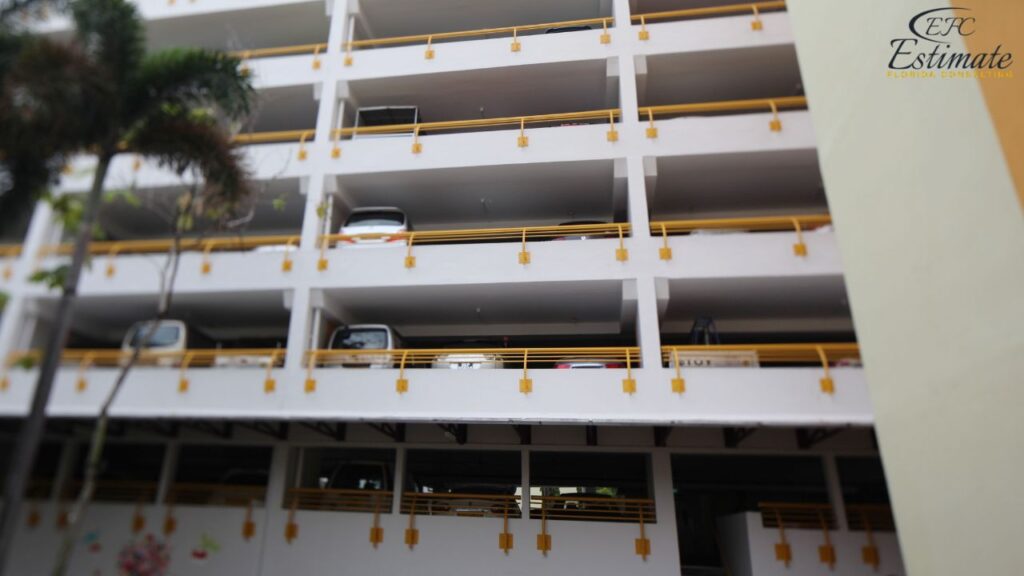
Concrete Parking Lot:
Concrete parking lots, ranging from $4.40 to $7.70 per sq.ft. for the material alone, are less common but can be found in select southern areas. While concrete fares better in warmer climates and offers customization options in terms of color and shape, it may require increased maintenance in colder regions due to susceptibility to cracking in freezing temperatures. When installed correctly and sealed periodically, concrete lots boast durability and low maintenance, lasting between 20 and 40 years.
Asphalt Parking Lot:
Asphalt remains the predominant choice for parking lot construction, with prices ranging from $7.70 to $14.30 per sq.ft. It strikes a balance between the affordability of gravel and the durability of concrete. Asphalt is particularly well-suited for colder climates, as it resists cracking and aids in snow melting due to its dark color. However, in areas with high temperatures, asphalt may take longer to cure and could potentially soften and deform. Regular maintenance, including cleaning and yearly washing, can extend the lifespan of asphalt lots to between 12 and 25 years.
Parking Garage Construction Cost Breakdown
The average cost of constructing a parking garage amounts to $10.73M for a 150,000 sq.ft. multi-level garage built above the ground. Labor expenses, accounting for 22.1% to 27.5% of the total cost, now stand at approximately $3.85M. Material costs make up 38.5% to 44% of the total, equivalent to about $4.52M. The allocation for machinery usage remains at 10% to 15%, amounting to approximately $1.32M. The remaining 10.7% to 33% or around $1.05M covers finishing and soft costs associated with the project.
Various factors influence the project’s overall cost, with the choice of structural system and materials being paramount. Options include precast forms, cast on-site concrete forms, or steel forms, each affecting expenses differently. Additionally, the decision between a short-span structure, which costs less but accommodates fewer cars, and a long-span structure, which incurs higher costs but accommodates more cars, plays a significant role in determining project costs.
Part of Project | Percentage of Total Cost |
Structural Engineer Fees | 1.1% – 22% |
Finishing | 5.5% – 11% |
Soft Costs | 5.5% – 11% |
Architect | 9.79% – 11% |
Equipment | 11% – 16.5% |
General Contractor | 16.5% – 22% |
Labor | 22.11% – 27.5% |
Material | 38.5% – 44% |
Construction Process
Before diving into any construction work, securing all the required permits is crucial. The initial step involves contacting utility companies to mark the locations of buried lines, ensuring their safety during excavation. Following this, any existing surface is removed down to the subgrade layer, which can serve as a suitable base if it’s in good condition, or it might need replacement. Similar to constructing a house, a base is laid out and compacted, followed by the installation of precast columns. Then, asphalt or concrete is poured and compacted using heavyweight vibratory rollers. Once dried, the structure or framework for upper levels is assembled using precast panels, girders, wall panels, stairs, and slabs. These precast elements are lifted and placed utilizing precast concrete lifting anchor systems, repeating the process for each level. Depending on preferences, ramp and elevator systems can be integrated during garage construction. After completing the primary construction, attention turns to finishing touches, including marking lot lines, adding bumpers, signs, sensors, and other decorative elements. Typically, construction duration ranges from 6 to 24 months, with larger projects potentially taking longer to complete.
Parking Lot Striping Cost by Type of Sign
The cost of striping a parking lot ranges from $0.22 to $0.33 per linear foot for a standard 4-inch line. Opting for thicker lines can increase the price, with 12-inch lines averaging around $0.71 per linear foot. For each square foot of striping, the cost typically falls between $0.22 and $1.1. To stripe approximately 50 car spaces, anticipate spending between $385 and $880. Most painters utilize 100% acrylic water-based traffic paint, ensuring vivid, resilient markings resistant to fading under heavy traffic. While less common, alternatives like chlorinated rubber, thermal plastic, or oil-based paint may also be used.
Incorporating additional shapes such as directional arrows, letters, pedestrian crosswalks, stall numbers, car stops, curb paintings, or handicapped logos incurs an extra cost, often priced individually depending on the complexity. Some companies may enforce a minimum fee, while others apply a surcharge ranging from 20% to 50% for areas without existing lines. Under dry, sunny weather conditions, the painted lines typically dry within approximately 4 hours.
Type of Sign | Cost (Labor Included) |
Lines | $0.22 – $0.72/linear foot |
Curb Painting | $0.55 – $1.65/linear foot |
Stenciled Numbers | $1.65 – $3.85/number |
Letters | $2.20 – $4.40/letter |
Directional Arrows | $11 – $33/each |
Stop Signs | $16.50 – $27.50/each |
Handicapped Logos | $27.50 – $33/each |
Pedestrian Crosswalks | $55 – $82.50/each |
Automated Parking Garage Cost
Constructing an automated parking garage typically reduces the cost per car to approximately $17,600 to $26,400 per space. While initially it might seem that automated garages, employing robotic technology for parking, incur higher expenses compared to traditional counterparts, this assumption is misleading. Automated garages utilize space more efficiently per car. They eliminate the need for ramps and driving lanes, allowing for a higher density of parked cars within the same area. Consequently, despite potentially higher overall costs due to increased space allocation for more vehicles, the cost per space remains competitive.
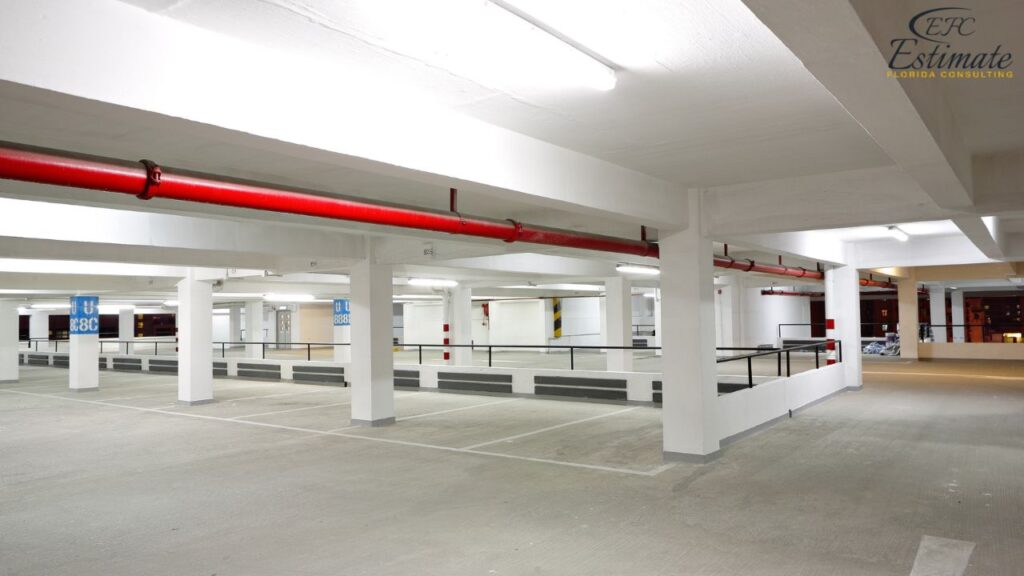
Parking Garage Maintenance Costs
The budget for total operating and maintenance expenses for a garage typically ranges from $440 to $660 per space per year, depending on whether it’s a surface lot or a garage structure. Similar to any building, a parking garage incurs regular maintenance costs. These include routine inspections, patching of cracks and potholes, addressing structural issues, waterproofing, and ongoing upkeep of electrical systems and other utilities. To mitigate maintenance expenses, consider installing photovoltaic cells or energy-efficient lighting on the garage roof.
Regular preventive maintenance such as sealing decks and replacing caulking and joints can help prevent more significant structural issues and reduce long-term costs. Utilize various forms and online checklists to assess the current condition of the lot and identify areas requiring attention. If necessary, seek advice from a qualified engineer to discuss maintenance and repair needs.
Repaving a Parking Lot
The cost of repaving a parking lot typically ranges from $1.10 to $7.70 per square foot, depending on the material used. Larger lots may receive a prorated price per square foot, while smaller lots may incur a higher per square foot cost. The frequency of repaving depends on factors such as the material type, climate conditions, and exposure to the elements. Lots in mild climates with adequate coverage may require less frequent repaving compared to those exposed to harsh weather conditions. Gravel lots, although the cheapest to repave, typically require more frequent maintenance. Conversely, concrete lots, while more expensive to repave, offer greater durability and longevity.
Enhancements and Improvement Costs
Parking Garage Elevator
The average cost of installing a four-person elevator in a parking garage is approximately $44,000, with prices ranging from $19,800 for a single-person elevator to $71,500 for elevators accommodating six people. Any multi-level garage requires at least one elevator to facilitate guest access to and from their vehicles. Elevators come in various types, including cable-driven, hydraulic, geared traction, chain-driven, gearless traction, and pneumatic, each suitable for specific projects. Hydraulic and pneumatic elevators are the most commonly used types. Additionally, construction of a garage elevator may necessitate permits, fees, and inspections.
Photovoltaic Systems
Photovoltaic systems typically start at $110,000 for canopy installations and can escalate in cost for larger garages. Parking garages often have significant energy consumption from indoor lighting, elevators, and other operational needs. Installing a photovoltaic energy system helps offset these expenses while also offering benefits such as shade provision and electric vehicle charging. Costs vary based on configuration, with individual solar panel prices typically ranging from $275 to $660 installed.
Parking Lot Sensors
Car park sensor systems typically range from $22 to $220 per sensor, depending on the required number of vehicle detection sensors and the software services utilized. Advanced systems may cost up to $440 per installed sensor. These sensors enhance parking utilization tracking and time efficiency by providing real-time information on available parking spaces. Installation and setup are typically completed within a day and are included in the per-unit price.
Parking Lot Bumpers
Parking garage bumpers, also known as curb stops, range in price from $25 to $82, depending on the installation materials. They serve to increase vehicle safety by preventing vehicles from leaving designated spaces and protect vehicles from contact with other structures. Bumpers are often distinct in color from parking spot markings but can vary based on preference.
For Commercial and Residential Building
Turnaround time is 1-2 days.
Win More Projects With Us
Parking Lot Pay Machine
Parking lot pay machines range in price from $5,500 to $22,000, depending on the desired features. These machines can be categorized as gated or non-gated parking payment systems. Gated systems offer options like flat-rate or full-featured systems, with flat-rate systems being more cost-effective due to requiring only one kiosk. Non-gated lots have various payment setups, including pay-and-display tickets, pay-by-space, pay-by-license, or phone payment systems.
License Plate Reader
Automated license plate readers (ALPRs) typically cost between $11,000 and $27,500, varying based on system quality and additional features. ALPRs offer parking lot owners an efficient way to scan numerous license plates rapidly, enabling them to enforce tolls and fees for unauthorized parking. Factors influencing ALPR costs include camera capability, speed, and optical character recognition (OCR) efficiency for data translation.
Conclusion
The cost of building a four-story parking garage varies based on multiple factors such as size, design, location, and materials used. On average, constructing a multi-level parking garage above ground can range from $8.25 million to $13.2 million, with a typical expenditure of approximately $10.725 million for a 150,000 sq.ft. structure. Traditional garages are more expensive per space compared to those constructed with precast materials, with costs ranging from $34,650 to $46,200 per space versus $21,450 to $28,600 per space, respectively. The cost per space also depends on the number of levels, with single-level garages averaging between $15,400 and $22,000 per space, while multi-level garages range from $20,900 to $33,000 per space. Location significantly influences costs, with urban areas generally incurring higher expenses. Enhancements like elevators, photovoltaic systems, parking lot sensors, bumpers, pay machines, and license plate readers add additional costs but contribute to efficiency and convenience. Despite the initial investment, parking garages are essential infrastructure investments that provide long-term benefits for businesses, municipalities, and urban centers by addressing parking needs and maximizing space utilization.
FAQs
The cost of constructing a 4-story parking garage varies based on factors such as size, design, and location. On average, expect to invest between $8.25 million and $13.2 million nationally. For a 150,000 sq.ft. multi-level garage above ground, the typical expenditure amounts to approximately $10.725 million.
Several factors affect the cost of building a parking garage, including size, design complexity, materials used, location, labor expenses, and additional features like elevators or automated systems.
Precast parking garages are generally more cost-effective than traditional ones due to streamlined construction processes. On average, precast garages cost between $21,450 and $28,600 per space, while traditional garages range from $34,650 to $46,200 per space.
The cost per square foot varies depending on the construction material and type of parking lot. For precast lots, expect approximately $55 to $88 per square foot. Underground lots typically range from $27,500 to $55,000 per space.
The number of levels impacts the cost per space. Single-level parking garages range from $15,400 to $22,000 per space, while multi-level garages average between $20,900 and $33,000 per space.
The operating and maintenance expenses for a parking garage typically range from $440 to $660 per space per year. This covers routine inspections, repairs, cleaning, and utilities.
Yes, enhancements like elevators, photovoltaic systems, parking lot sensors, bumpers, pay machines, and license plate readers can increase initial construction costs but may offer long-term benefits in efficiency, safety, and revenue generation.
Process To Get 4 Story Parking Garage Estimate Report
Here I am going to share some steps to get a 4-storey parking garage cost estimate report.
-
You need to send your plan to us.
You can send us your plan on info@estimatorflorida.com
-
You receive a quote for your project.
Before starting your project, we send you a quote for your service. That quote will have detailed information about your project. Here you will get information about the size, difficulty, complexity and bid date when determining pricing.
-
Get Estimate Report
Our team will takeoff and estimate your project. When we deliver you’ll receive a PDF and an Excel file of your estimate. We can also offer construction lead generation services for the jobs you’d like to pursue further.
Process To Get to Cost to Build a 4 Story Parking Garage Contractor
Here I am going to share some steps to get your cost to build a 4 story parking garage contractor.
-
You need to send your plan to us.
You can send us your plan on info@estimatorflorida.com
-
You receive a quote for your project.
Before starting your project, we send you a quote for your service. That quote will have detailed information about your project. Here you will get information about the size, difficulty, complexity and bid date when determining pricing.
-
Get Estimate Report
Our team will takeoff and estimate your project. When we deliver you’ll receive a PDF and an Excel file of your estimate. We can also offer construction lead generation services for the jobs you’d like to pursue further.
Reach Out To Us
Places to visit if you new in Florida
North Ocean Boulevard winds gracefully along the coastline, offering mesmerizing views of the endless expanse of the Atlantic Ocean. Lined with swaying palm trees, charming cafes, and boutique shops, it exudes an undeniable charm and sophistication. From the tranquil ambiance of daylight to the enchanting allure of twilight, this boulevard captivates with its timeless beauty, inviting all who wander its path to bask in the serenity of coastal living.
Seagate Beach epitomizes coastal paradise with its pristine sands, azure waters, and swaying palms. Nestled along the southeastern coast, this secluded haven offers a serene retreat for beachgoers seeking tranquility and natural beauty. The rhythmic melody of the waves lulls visitors into a state of relaxation, while the warm sun kisses their skin. Whether lounging on the soft sands, taking a refreshing dip in the gentle surf, or simply savoring the breathtaking ocean views, Seagate Beach promises an unforgettable escape into blissful serenity.
Lillywoods Highland Beach Resort is a luxurious oasis nestled on the pristine shores of Highland Beach, offering an unparalleled blend of elegance and relaxation. Surrounded by lush tropical gardens and overlooking the glistening waters of the Atlantic Ocean, this exclusive retreat exudes a sense of serenity and sophistication. From the moment guests arrive, they are enveloped in the warm embrace of hospitality, with personalized service and attention to detail at every turn.
The center boasts an indoor museum showcasing captivating exhibits, intimate aquariums, and a charming gift shop. Step outside to discover expansive outdoor attractions, including impressive aquariums housing diverse ecosystems for fish, turtles, and other marine creatures. Wander along the boardwalk trail through the neighboring woods or immerse yourself in the enchanting butterfly garden designed for peaceful observation.

